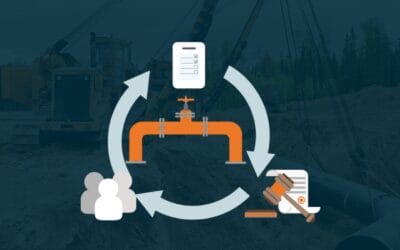Today, business progress is being driven by digital transformation, especially when it comes to field service management (FSM). The landscape is changing, and operations managers must remain informed, implement new business models, and stay one step ahead of the competition.
In this article we’ll update you on current FSM technologies, discuss their benefits, and lay out the best ways to implement them into your business.
Field Service Management Technologies
In the not-so-far future, field service management technology will be essential to the survival of enterprises as advanced tools enable deskless workers to perform more productively and effectively (some would say that future is already here!). Every business is adopting solutions to help assist its organization increase its digital maturity, and the field service sector is no exception.
FSM technologies are tools that enable field personnel to provide consumers with dependable, high-quality goods and services (frequently by automating manual processes). The ideal FSM tool addresses particular problems faced by field workers and are specifically designed with the deskless workforce in mind. They eliminate the practical obstacles for performing fieldwork and make it possible to execute field services more successfully and productively.
Today’s field service technology can be grouped together into several categories, based on the specific business challenges they aim to solve, their primary functions, and key benefits:
Digital and self-service tools
Customers frequently prefer to make their own appointments because they expect service when and where they want it. Through account portals, mobile, and web-based platforms, they are able to achieve this thanks to digital and self-service technologies. They can set up appointments based on their own needs and preferences, instantaneously view real-time availability, and alter or cancel them as necessary.
Self-service includes material such as knowledge bases, help centers, on-site chatbots, and FAQ sites that allow users to get rapid answers to their most pressing queries.
Automated scheduling software
All of the time-consuming, risky guessing involved in human scheduling techniques is eliminated by automated scheduling software. Instead of using a whiteboard, email, spreadsheets, or online calendars, automated technologies can rapidly create optimum schedules while taking into consideration your company’s limits and priorities.
These systems provide optimum route management and match the right person to the right job (based on skill sets, certifications, geography, availability, and more). They offer real-time schedule updates to clients, field employees, and staff schedulers (in the form of accurate arrival time windows).
Additionally, automated tools make it possible for maintenance scheduling programs to be more effective because they can manage complex processes and scheduling requirements with ease.
To ensure that nothing is missed, some technologies even provide dynamic messaging for streamlined communication between the back office, mobile workers, and clients.Remote collaboration tools
Deskless workers do not have the luxury of interacting and collaborating with their coworkers face-to-face throughout the working day. Since 80% of remote workers report feeling more excluded than their in-office colleagues, field service firms should give priority to investing in systems that keep them engaged. Failure to do so can result in disengagement and challenges following miscommunication.
Deskless workers may connect with their coworkers and customers more effectively when out in the field thanks to mobile-first FSM collaboration tools. They provide real-time updates and streamlined, centralized communication, saving users time and energy by eliminating the need to switch between different apps (such as Slack, email, tech support tickets, phone calls, etc.) in order to find and share the information they require, solicit assistance, or complete tasks accurately the first time.
Some collaboration tools can even enable field workers to remotely troubleshoot more simple issues, saving both time and the cost of traveling to a client site to remedy a problem.
The Results of Implementing Field Service Management Technologies
Successful field service organizations know that the right technologies are the backbone of their deskless workforce. By implementing strong tools, your business can reap these key benefits:
Increased productivity
The efficiency of your team is increased through automated scheduling, completely optimized routes, precise data, storage, and access. With the correct FSM technologies, you can receive real-time insights from your deskless workforce and take prompt action to remove workflow bottlenecks and increase productivity.
Staff schedulers and dispatchers can service more customers throughout the day by getting the right person to the right job at the right time (and every time) with these crucial features at their disposal. They can maximize operations for a more profitable company because they are no longer dependent on manual processes that limit their ability to concentrate on higher-value activities.
Customer Satisfaction
Customer expectations are rising, thus field service organizations must put a priority on personalization, speed, and responsiveness in their daily operations to avoid losing customers to rival businesses. By continually providing superior customer experiences, you may meet (or even exceed) these expectations.
With the correct FSM solutions, you can obtain visibility into every aspect of your field service operation, making it simple to identify areas for improvement. They assist you in developing a stronger, more efficient scheduling and dispatching procedure, giving your clients the assurance that your field personnel will always show up on time, prepared, and ready to do the job.
Advanced tools also assist you in enhancing maintenance procedures so that you consistently achieve your service-level agreements (SLAs), which results in happier and more assured clients. Because they allow for quicker, more efficient work and precise customer and job information, they even streamline billing cycles (thanks to mobile data collection capabilities).
Greater communication across departments
For field service organizations, where a sizable amount of their staff works outside of a traditional office setting, cross-departmental communication can be challenging. Modern FSM technologies centralize everything but arming your field workers with a plethora of communication and collaboration apps can only complicate matters and create maddening chaos—preventing them from sending and receiving updates when they are most needed. For a truly cohesive operation, each team can always draw on the most recent, shared information because data from every department is connected.
Increased Revenue
Lower overhead costs result from improved scheduling, dispatching, routing, inventory control, and communication. Better employee perks, lower customer service costs (which are already a competitive advantage), and higher profit margins are the results of this.
Operations teams may rapidly recognize trends of high and low client demand because to these technologies’ increased worker visibility, which enables them to prevent expensive overstaffing. Tools that facilitate field work also increase employee happiness, helping the company better retain staff and reduce high turnover costs.
How To Utilize Field Service Management Technologies
Any FSM technology a company chooses is only as good as its implementation, so be sure to follow these best practices for correctly utilizing new and existing tools:
Choose the right tools
Instead of investing in every shiny new tool that comes around, organizations should only use technologies that solve actual business problems. Not all field service management technology is built equally, and thus not every tool has the capabilities your business needs to gain a competitive edge. Instead of cobbling together single-point applications, look for a holistic FSM solution that helps you manage the complexities of your workforce in a single, centralized location.
Before you invest in a tool, take stock of what your team needs to be empowered to do their best work. They likely need tools that help them communicate with one another and their customers, technology that streamlines the scheduling process, an app for optimized routing, and a system for easy field data collection. As you evaluate your options, try to find a solution that offers all of these capabilities in one. It’ll help your team maintain their efficiency without sacrificing functionality. Plus, it’ll make adoption across the team a breeze, since they won’t be forced to learn how to use 20 different tools.
Integrate your current systems
Your FSM solution isn’t the only thing your business needs to succeed. You also rely on your existing tools (like your HR platform, finance software, CRM, payroll system, and more), but if these systems aren’t connected, you’ll likely face mounting data silos and workflow bottlenecks.
Make sure your FSM tool(s) connects with your other critical systems so that everything runs like a well oiled machine. This will save time in data re-entry and will help you generate interoperable data to uncover key business insights. In turn, you can streamline your operations, reduce costs, and find otherwise unnoticed opportunities for improvement and growth.Keep an eye on your analytics
Keep an eye on your analytics
Tracking and measuring your KPIs is crucial for identifying inefficiencies and outperforming your competitors. It’s also difficult with manual processes and tools, so make sure you use FSM technology that bridges the gap.
The right tool can collect, collate, and communicate data in a way that’s easy to understand, so you can continuously improve your strategy. Modern FSM solutions can also generate actionable reports that tell you how your team is currently performing, how trends have changed over time, and how to course-correct the negative trends before they become larger problems.
Aimsio
As you build and execute your digital transformation strategy, your field service organization needs tools that keep them ahead of the curve. The right FSM technologies can help your business ensure efficient scheduling, optimized routing, better collaboration and communication, and improved maintenance—all for increased customer satisfaction and a healthier bottom line.
Aimsio’s all-in-one platform helps businesses optimize their operations for scalable growth. With tools for automated scheduling and dispatching, intelligent job matching, paperless ticketing & invoicing, easy field data collection, and seamless communication, Aimsio can help your team thrive in today’s field service industry.




